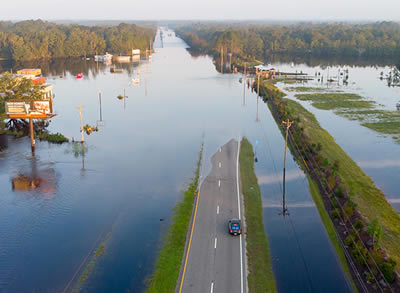Written by
Jan Brooke, World Association of Waterborne Infrastructure (PIANC), focal point for 'Navigating a Changing Climate'
UNCTAD’s timely and topical meeting on climate change adaptation for transport gave experts from the road, rail, air and waterborne transport sectors, as well as those from governments, institutions and academia the opportunity to share many examples of good practices of climate change adaptation from around the globe.
Experts also expressed their collective concern about the lack of attention to transport adaptation, including within the official processes of the UN Framework Convention on Climate Change (UNFCCC).
Presentations from UNCTAD, the World Meteorological Organization and the European Union Joint Research Centre provided background information and were followed by sector-specific sessions on inland waterways and shipping, road and rail, and airports and aviation.
Many common themes and key messages emerged from the discussions, including: the lack of understanding of climate change-related risks; difficulties obtaining funding or justifying investment in improved resilience; a demand for adaptation-specific guidance, codes and standards; and the value (but often the absence) of regulation as an incentive.

It was also clear that training and capacity-building are urgently needed to help address the lack of knowledge and sometimes-flawed perceptions, and to support changes in behaviour.
In developing and delivering appropriate resources, however, care needs to be taken to avoid maladaptation by balancing the need for ‘standards’ with the realities of climate change uncertainty.
Attention needs to be paid to communicating the benefits of flexible solutions and to the vitally important role of monitoring and adaptive management.
The meeting provided an important opportunity to discuss how best to address some of the challenges identified.
Informed by presentations explaining current policy, some of the financing constraints and opportunities, and ongoing work on standards, participants worked in plenary to agree on a way forward.
There was general support for a new standing forum, possibly convened by UNCTAD, to address and promote awareness on transport resilience and adaptation issues.
Several possible routes for contributing to the UNFCCC process were also identified, including:
-
Raising the profile of adaptation within the existing Paris process on mobility and climate-led (and mitigation-dominated) coalition of Marrakech Partnership transport initiatives.
-
Collaborating on a new UNCTAD-led activity to prepare sectoral interventions intended to raise awareness on the importance of transport resilience and adaptation, for example as inputs to the forthcoming UN Action Summit as well as into the formal process of UNFCCC.
-
Exploiting other opportunities, including through individuals or organizations with observer status (for example on the UNFCCC Adaptation Committee) and by providing input via the research dialogue.
Participants acknowledged, however, that transport stakeholders cannot work alone; it is essential to engage with interested contracting parties, in particular by supporting their efforts in the political arena by signposting relevant publications and other facts, and by providing case studies.
Therefore, good practices should be collated and shared; research requirements and outputs should be coordinated; and some patience may be required.
But at least the sector now has a plan of action, and UNCTAD’s initiative in convening the meeting was very much appreciated.


